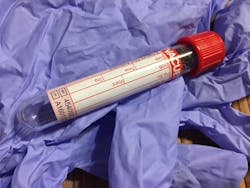Two tests could help improve treatments for COVID-19 patients
A new study shows that a rapid test could identify which COVID-19 patients are responding to drug treatments and which patients are still deteriorating and need higher doses of medication. Findings on this method and on a second test that could predict COVID-19 severity were presented at the virtual 2020 AACC Annual Scientific Meeting & Clinical Lab Expo, according to a press release.
Studies show that drugs known as corticosteroids reduce the risk of death in critically ill COVID-19 patients by one-third. In spite of the promise of these drugs, though, clinicians still have concerns about their potential side effects. Corticosteroids work by dampening the activity of a patient’s immune system to prevent it from attacking and damaging the lungs. Clinicians, therefore, worry that prescribing these drugs either too early or at too high a dosage could worsen a patient’s condition by hindering the body’s ability to clear the virus.
A team of researchers led by Tahel Ilan Ber, MD, and Eran Eden, PhD, of MeMed, and Shaul Lev, MD, of the Rabin Medical Center in Israel, demonstrated that MeMed’s 15-minute blood test for the protein interferon gamma induced protein 10 (IP-10) could help guide treatment with corticosteroids. Using this test, the researchers measured IP-10 levels twice a day over the course of a month in 52 SARS-CoV-2 positive patients, 26 of whom developed severe COVID-19. This revealed that severe patients had very high median IP-10 levels (1,190 pg/mL), compared to the median IP-10 levels of the non-severe group (328 pg/mL). In 17 of the severe patients treated with corticosteroids, though, median IP-10 levels fell from 2,961 pg/mL to 372 pg/mL within 3-5 days. Only two of these patients eventually died of COVID-19-related complications, and both of them exhibited IP-10 flare-ups of greater than 1,000 pg/mL after initiation of corticosteroids.
Another major challenge in the fight against COVID-19 has simply been ensuring that hospitals have enough beds and ventilators for patients who need intensive care.
Two different research teams have now shown that a blood test for calprotectin could predict which patients are at risk of decline, enabling hospitals to better allocate essential resources. Using this test, the first team, led by Aleksandra Mandic Havelka, PhD, from Karolinska Institute and Gentian Diagnostics in Stockholm, Sweden, found that intensive care unit (ICU) patients with COVID-19 had significantly higher calprotectin levels compared with ICU patients without COVID-19. The second team, led by Luis García de Guadiana-Romualdo, PhD, of Hospital Universitario Santa Lucía in Cartagena, Spain, then found that calprotectin levels were significantly higher in COVID-19 patients who required mechanical ventilation and/or died compared with other non-severe COVID-19 patients.
The second team also compared the calprotectin test’s performance with that of other tests for COVID-19 severity that are currently in use. Out of the other tests they studied, they found that a test for C-reactive protein (CRP) was the only one that predicted both a patient’s need for mechanical ventilation and mortality as accurately as calprotectin.
“The important difference between CRP and calprotectin is that calprotectin is a much faster biomarker for inflammation and infection, and an earlier indicator that a patient is getting worse,” said Havelka, who also worked on the second study. “This means that calprotectin is better suited for making urgent decisions about which COVID-19 patients need to be prioritized and treated with the optimal level of care.

